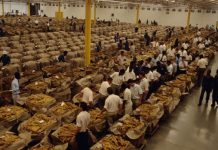PESHAWAR, FEB 02 (DNA) — Public health experts have called for adoption of a multi-faceted approach to address the growing economic burden of tobacco consumption, driven by a sharp rise in preventable diseases. The strategy should focus on mitigating the widespread health and financial consequences of tobacco use through comprehensive and coordinated efforts, they added.
“The economic burden of tobacco use in Pakistan amounts to over 615 billion rupees including direct costs, such as healthcare expenditures for treating tobacco-related diseases, and indirect costs, such as lost productivity due to illness and premature death,” shares Sana Ahmad, Programme Manager Blue Veins, a non-governmental organization striving to promote awareness about threats of tobacco on public health.
Talking to media, Sana said due to lack of effective legislation regarding tobacco control and to curb consumption and trade of modern form of smokeless tobacco products like e-cigarettes, heated tobacco, sheesha etc, the regulating authorities are facing difficulties in taking action against the violators.
Presently, she said, there is no check on supply and trade of tobacco products through social media or e-business and such products including e-cigarettes and heated tobacco are openly imported and supplied to people through home delivery.
The number of tobacco user in our country are estimated around 24 million adults while the smokeless tobacco like gutka and naswar are widely available and affordable, making them accessible to even the poorest segments of society.
The economic burden of tobacco extends beyond healthcare. Tobacco use disproportionately affects the working-age population, leading to lost productivity due to illness, disability, and premature death, she laments. The government spends billions of rupees each year on treating tobacco-related diseases, money that could otherwise be invested in improving healthcare infrastructure, education, or poverty alleviation programs.
“Tobacco is a leading cause of preventable diseases in Pakistan, including lung cancer, heart disease, stroke, and chronic obstructive pulmonary disease (COPD). Every year, thousands of people die from tobacco-related illnesses, placing an enormous strain on the countries already overburdened healthcare system,” comments Dr. Muhammad Taj, a pulmonologist serving in KP Health Department.
“Most of patients are poor laborers who started smoking at a young age and by the time they come to us, they are in the advanced stages of lung disease,” Dr. Taj told media. Many tobacco users are the sole breadwinners for their families, and when they fall ill or die, their families are left in dire straits, he added.
“Apart from inflicting economic burden, tobacco consumption is also threatening food crisis by bringing large portion of farm lands under cultivation,” observed Waheed Ahmad, Patron in Chief of Pakistan Fruits and Vegetable Importers and Exporters Association.
There is need of promoting the concept of transforming tobacco growing practices into crops farming to overcome grave problem of food insecurity faced by 36.9 percent of population of the country, Waheed opined.
“In the wake of food crisis faced by our country due to impacts of climate change and devastating floods of 2022, its utmost need of the hour to find ways for increasing food production through switching of tobacco growing practices into farming of crops, especially cash crops,” emphasis Waheed.
“Tobacco is grown in all four provinces, but it is predominantly grown in KP where it is a major part of the local agrarian economy,” observed Taimoor Khan, General Secretary Khyber Pakhtunkhwa Association for Excellence in Agriculture. In KP tobacco is grown on around 30,000 hectares of land and if half of this farming area is converted to growing of vegetable and food grains, the farmers would make a remarkable earning and profits, Taimoor claimed.
By transforming tobacco farming to food production, we can create a ripple effect that promotes food security, improves public health, contributes to the overall well-being of our communities and benefit the environment,” opined Aftab Alam Khan, an international expert on climate change and CEO of Resilient Future International.
According to research findings, cultivation of tobacco requires heavy use of pesticides and fertilizers which causes soil degradation and affects its fertility, thus lowering the used land’s capacity to grow other crops.
Government should work over the policy and announce incentives for farming community in a bid to convince them towards switching from their decades old choice of tobacco growing,” Khan suggested. —DNA

















